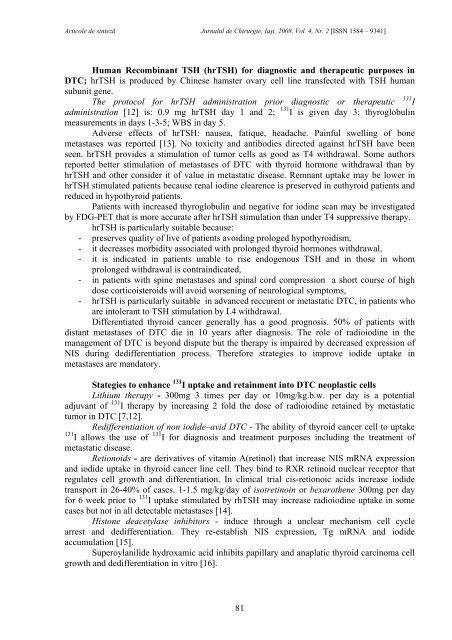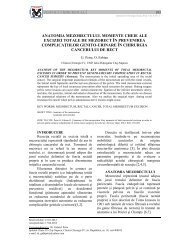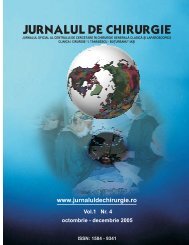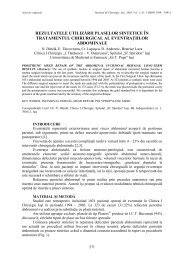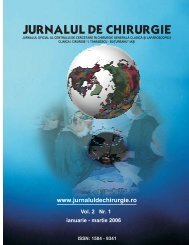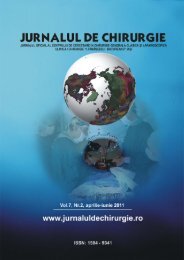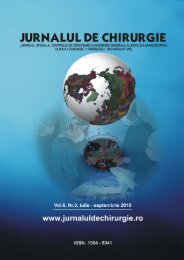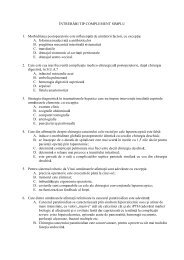Full text PDF (3.9MB) - Jurnalul de Chirurgie
Full text PDF (3.9MB) - Jurnalul de Chirurgie
Full text PDF (3.9MB) - Jurnalul de Chirurgie
Create successful ePaper yourself
Turn your PDF publications into a flip-book with our unique Google optimized e-Paper software.
Articole <strong>de</strong> sinteză <strong>Jurnalul</strong> <strong>de</strong> <strong>Chirurgie</strong>, Iaşi, 2008, Vol. 4, Nr. 2 [ISSN 1584 – 9341]<br />
Human Recombinant TSH (hrTSH) for diagnostic and therapeutic purposes in<br />
DTC; hrTSH is produced by Chinese hamster ovary cell line transfected with TSH human<br />
subunit gene.<br />
The protocol for hrTSH administration prior diagnostic or therapeutic<br />
131 I<br />
administration [12] is: 0.9 mg hrTSH day 1 and 2; 131 I is given day 3; thyroglobulin<br />
measurements in days 1-3-5; WBS in day 5.<br />
Adverse effects of hrTSH: nausea, fatique, headache. Painful swelling of bone<br />
metastases was reported [13]. No toxicity and antibodies directed against hrTSH have been<br />
seen. hrTSH provi<strong>de</strong>s a stimulation of tumor cells as good as T4 withdrawal. Some authors<br />
reported better stimulation of metastases of DTC with thyroid hormone withdrawal than by<br />
hrTSH and other consi<strong>de</strong>r it of value in metastatic disease. Remnant uptake may be lower in<br />
hrTSH stimulated patients because renal iodine clearence is preserved in euthyroid patients and<br />
reduced in hypothyroid patients.<br />
Patients with increased thyroglobulin and negative for iodine scan may be investigated<br />
by FDG-PET that is more accurate after hrTSH stimulation than un<strong>de</strong>r T4 suppressive therapy.<br />
hrTSH is particularly suitable because:<br />
- preserves quality of live of patients avoiding prologed hypothyroidism,<br />
- it <strong>de</strong>creases morbidity associated with prolonged thyroid hormones withdrawal,<br />
- it is indicated in patients unable to rise endogenous TSH and in those in whom<br />
prolonged withdrawal is contraindicated,<br />
- in patients with spine metastases and spinal cord compression a short course of high<br />
dose corticoisteroids will avoid worsening of neurological symptoms,<br />
- hrTSH is particularly suitable in advanced reccurent or metastatic DTC, in patients who<br />
are intolerant to TSH stimulation by L4 withdrawal.<br />
Differentiated thyroid cancer generally has a good prognosis. 50% of patients with<br />
distant metastases of DTC die in 10 years after diagnosis. The role of radioiodine in the<br />
management of DTC is beyond dispute but the therapy is impaired by <strong>de</strong>creased expression of<br />
NIS during <strong>de</strong>differentiation process. Therefore strategies to improve iodi<strong>de</strong> uptake in<br />
metastases are mandatory.<br />
Stategies to enhance 131 I uptake and retainment into DTC neoplastic cells<br />
Lithium therapy - 300mg 3 times per day or 10mg/kg.b.w. per day is a potential<br />
adjuvant of 131 I therapy by increasing 2 fold the dose of radioiodine retained by metastatic<br />
tumor in DTC [7,12].<br />
Redifferentiation of non iodi<strong>de</strong>–avid DTC - The ability of thyroid cancer cell to uptake<br />
131 I allows the use of 131 I for diagnosis and treatment purposes including the treatment of<br />
metastatic disease.<br />
Retionoids - are <strong>de</strong>rivatives of vitamin A(retinol) that increase NIS mRNA expression<br />
and iodi<strong>de</strong> uptake in thyroid cancer line cell. They bind to RXR retinoid nuclear receptor that<br />
regulates cell growth and differentiation. In clinical trial cis-retionoic acids increase iodi<strong>de</strong><br />
transport in 26-40% of cases. 1-1.5 mg/kg/day of isotretinoin or bexarothene 300mg per day<br />
for 6 week prior to 131 I uptake stimulated by rhTSH may increase radioiodine uptake in some<br />
cases but not in all <strong>de</strong>tectable metastases [14].<br />
Histone <strong>de</strong>acetylase inhibitors - induce through a unclear mechanism cell cycle<br />
arrest and <strong>de</strong>differentiation. They re-establish NIS expression, Tg mRNA and iodi<strong>de</strong><br />
accumulation [15].<br />
Superoylanili<strong>de</strong> hydroxamic acid inhibits papillary and anaplatic thyroid carcinoma cell<br />
growth and <strong>de</strong>differentiation in vitro [16].<br />
81


